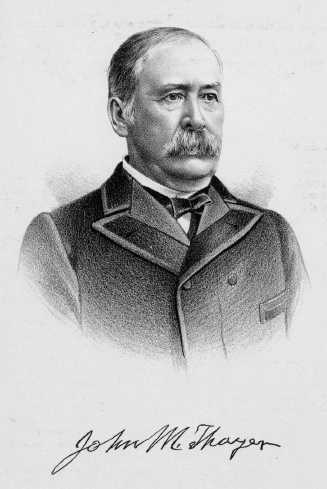132 JOHN
M. THAYER.
JOHN
M. THAYER.
point, which we might mention, our subject was
appointed by Gov. Izard to act in conjunction with
Gov. O. D. Richardson, to inquire into certain
outrages by Pawnees, to meet them in council and
effect a treaty with them; in this they were fairly
successful. But later events proved the lesson was but
poorly learned by the Indians. In 1858, with a command
of 194 volunteers, our subject went out after the same
tribe, certain of their number having murdered,
maltreated and robbed the settlers. He captured the
entire tribe after a stubbornly contested battle,
which was fought on the grounds occupied by the town
of Battle Creek, which derives its name from that
event.
As Colonel of the 1st Nebraska
Infantry, our subject did good work in behalf of the
Union, and it was not long before his superior
military powers attracted attention, and he was
promoted to be Brigadier General and breveted Major
General. At Ft. Donelson and Shiloh he commanded a
brigade in such excellent manner as led to the above
honor. Through the siege of Vicksburg and the capture
of Jackson, Miss., he also commanded a brigade, and
for a time a division. The confidence of the
commanders in him was such that at the assault at
Chickasaw Bayou, one of the storming columns was
confided to his care. In this fight he had his horse
shot under him, and again while leading a charge at
Arkansas Post. All the essential features,
characteristics and traits of the successful soldier
were possessed by him, and this being recognized
resulted in the Army of the Frontier being given him
to command. Throughout his service in military life he
was a true soldier, a favorite with his men, who were
confident that he would lead them to success and
victory; respected by his officers, who well knew his
sagacity and military genius, largely the result of
his long experience on the frontier.
In political matters our subject was
a Democrat until the repeal of the Missouri
Compromise. He sympathized with the Free-Soil
movement, but being in the Territory he could not
vote. In the year 1856 he supported Fremont, and since
that time has continued a stanch Republican. Upon the
admission of Nebraska as a State, Mr. Thayer was
elected United States Senator in the election of 1866,
and served faithfully until the close of his term. At
the expiration thereof he was appointed by Gen. Grant
the Governor of Wyoming Territory. In this office the
qualities that had made him successful in civil life,
that had made him a military leader and commander, the
ability that had been developed for the handling of
large bodies of men, the harmonizing of heterogeneous
elements, combined to make his Governorship one worthy
of note, and, doubtless was the cause of the
confidence expressed by the people of Nebraska in
after days.
The home of our subject is one that
bears in its every-day life and happiness a brightness
and completeness that is more to be desired than the
amassing of riches, the accumulation of power, or the
right to sway the scepter of authority. He was united
in the holy bonds of matrimony with Mary T. Allen, a
lady possessing a disposition, character and
intelligence, most beautiful, admirable and clear, one
who has been trained to follow closely the Great
Exemplar of the true life. She is the daughter of the
Rev. John Allen, a clergyman of the Baptist Church, a
native of Massachusetts.
Gov. Thayer, though not a member of
any special denomination, is a firm believer in the
Christian religion, and always has been. His family
adhere to the faith of the Baptist Church, of which
also his parents were members. In that communion,
also, he was trained and brought up, and he has always
retained a great desire to help forward every movement
of religious nature; whenever it has been possible to
elevate the moral standard of the people, his active
sympathies were engaged. One feature of his
Governorship has been his evident anxiety that a more
general and hearty acquiescence to a higher moral and
reliious standard should obtain, and whatever
enterprises, projects, societies or associations,
looked to this as their aim and object, were at all
times sure of his hearty sympathy and support. As
noted above, our subject stood before the people of
Nebraska in the year 1886 as candidate for Governor.
He was warmly received, actively and heartily
supported, and enthusiastically elected by a majority
of 25,000, in which he ran about 2,000 ahead of his
ticket. His administration has revealed the wisdom of
this choice, and it is not too much to say that the
citizens of Nebraska have at no time had occasion to
repent of their choice.

